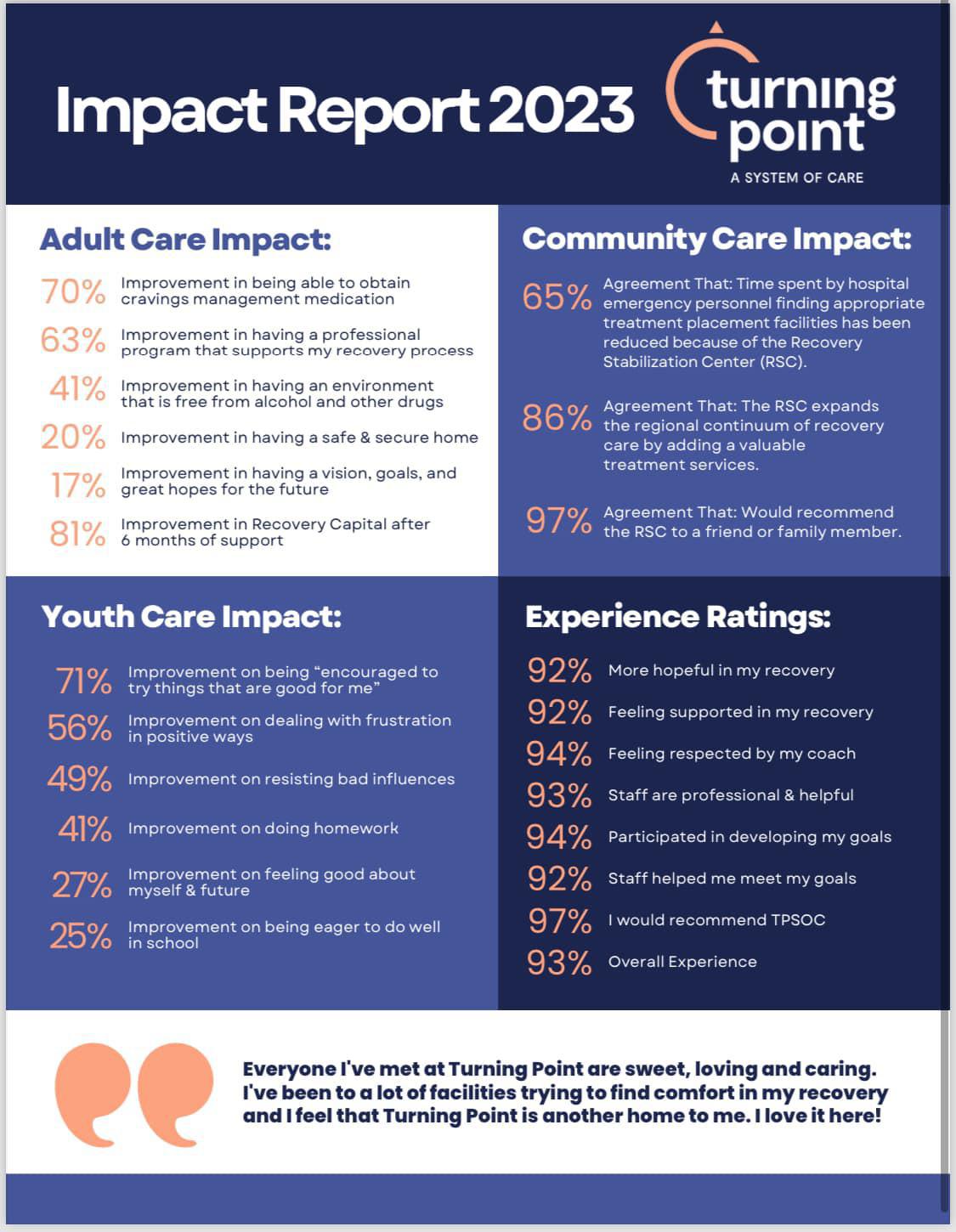2nd Shift Sewer & Plumbing® is the leading provider of plumbing services in Howard County and the surrounding areas. With more than 30 years of experience, their knowledgeable and licensed technicians have the expertise to fix any plumbing or sewer problem you may have.
Five years ago, Turning Point a System of Care came online in Howard County. Operating out of a small office with a limited staff, Dr. Matt Oliver led the team in the quest for recovery in the community.
Five years later, Oliver gave the organization’s annual report to the Howard County Commissioners on Feb. 5, accounting for the tax dollars and opiate settlement funding that came through and from the county. The report was a positive one, showing that the organization’s Residential Recovery Stabilization Center, first opened in November 2022, has served more than 400 people.
“It would not be an exaggeration to say that the county has helped us tremendously by investing in Turning Point,” said Oliver.
Turning Point receives funding from several sources, including insurance and Medicaid reimbursement, community, statewide and federal grants, and local funding from Howard County and the City of Kokomo. With that money, the organization offers psychiatric care, outpatient therapy, short-term residential recovery stabilization services, and support through connecting to other needed services and group meetings.
Oliver explained that nearly 2,000 people sought some level of service from Turning Point in 2023, including the 400 who utilized residential recovery stabilization. The most common affliction seen in those seeking services was methamphetamine addiction, followed by opioids and alcohol. Other substances and mental health issues fell beneath those top three issues.
“People don't usually die of meth, but when it's laced with fentanyl, it can become deadly,” said Oliver. “So, each of those (top three) things presents life-threatening concerns. I'm grateful that our community has been investing in this infrastructure to make sure things were going okay and to give people a helping hand and some hope.”
Oliver explained the impact of the care provided by Turning Point since its inception five years ago. Providing access to medication, psychiatric treatment, and addiction recovery services meant in 70 percent of those seeking Turning Point services stabilized, reduced dependency, or experienced full recovery. If those people stayed with the support program for six months, that number jumped to 80 percent.
That longer term level of service helps the person in recovery reshape their lives. Turning Point staff assist in finding housing, employment, and education, and they provide a support community where participants continue to improve.
“Sustaining recovery, staying engaged, and working with their peers,” said Oliver. “The people you hang around with help shape the purpose that you feel in your life, so all these things are important.”
How the community, particularly stakeholders in Turning Point’s mission, see the organization’s impact is also important. Perception is reality, and Oliver explained that 65 percent of the stakeholders believe Turning Point has reduced time spent by hospital personnel to find placement at treatment facilities. And 86 percent believe that the continuum of care has been expanded by its work.
But the final statistic Oliver shared was his favorite.
“I am glad to say that 97 percent would recommend Turning Point as a treatment option,” said Oliver. “If you talk people who've gone through there, they say Turning Point feels different. Turning Point feels like they care. It's because we invest in so many of our staff having recovered.
“I've no doubt about it when I walk around the unit and circle the halls. The staff connects well with people who are struggling because they have experienced that struggle.”
Those who have completed the program also gave Turning Point high marks in 2023. Ninety-three percent agreed that the organization was extremely helpful in their recovery.
The number of clients seen in 2023 averaged 465 per month. While Howard County still experiences an overdose rate above the national average, the incidents have declined over the past five years, falling in line with the statewide average instead of leading the field.
“Howard County started out with a much higher rate, much higher than the state average,” said Oliver. “In 2017, we had 53. overdose fatalities per 100,000 residents versus the state average of 29. If you look at 2023, we nearly converged with the state average.”
Oliver credits an increase and improvement in addiction recovery infrastructure as the main impetus. He recognized that there are a growing number of service providers entering the Howard County market. But it is also the level of services being provided.
“There's more residential housing,” said Oliver. “You have medication-assisted treatment. Last year, Turning Point distributed more than 7,200 Narcan kits for harm reduction. We're doing street outreach. We're getting people housed. We're supporting them with active collaboration with probation.
“It says that what Howard County is investing in is different. I think that investment in a subacute, residential stabilization Center makes a huge difference. The reality is, people go to the emergency departments and are told to follow up in an outpatient service where it could be weeks before they receive treatment. So, they keep using.
“Moreover, if you have peer support to help people not just get stabilized, but stay engaged, walking side-by-side with them to get housing and stay in recovery, that makes a difference.”
Paul Wyman, president of the board of director for Turning Point and former Howard County Commissioner, spoke to his former colleagues and gave thanks to them and Turning Point for making a difference.
“When you look at the majority of our employees, they have found a life of recovery; many of them through Turning Point,” said Wyman. “It's exciting to see not only their lives turning around, but how impactful they are in helping other people turn their lives around.
“The connections they're able to make and that sense of hope are things that oftentimes people don't get at other places. It's kind of like our secret sauce if you will. That connectivity, that loving on people that becoming part of their story the minute they come through the door has been a game changer.”
Additional information about Turning Point A System of Care, along with its annual report, are available by calling 765-860-8365, visiting www.turningpointsoc.org, or visiting the facility at 1234 N. Courtland Ave.




